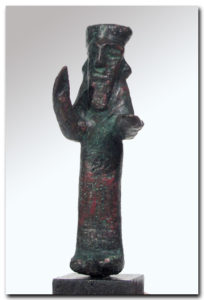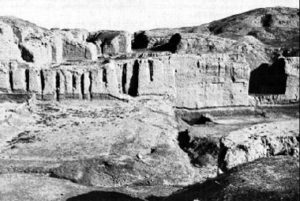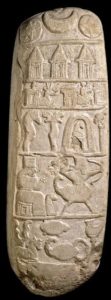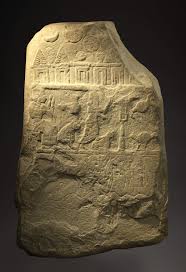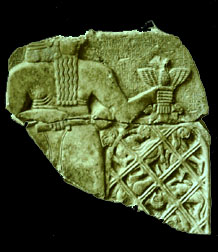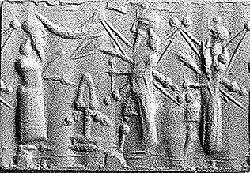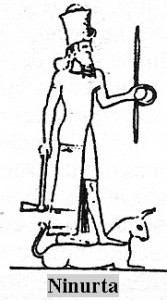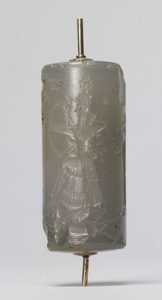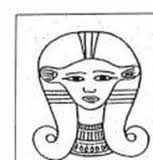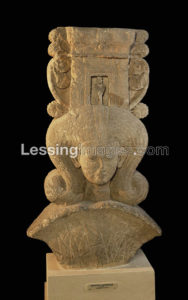Uttu = Enki & Ninimma’s Daughter,
or Enki & Ninkurra’s Daughter
Goddess of Clothing, Weaving
(Texts: All Artifacts, Color Coding, & Writings in Bold Type With Italics Inside Parenthesis, are Added by Editor R. Brown, not the Authors, Translators, or Publishers!)
(gods in blue)
Uttu As Ninimma’s Daughter:
“Ninimma, like juniper oil, like oil of abundance, gave birth to Uttu, the exalted (?) woman.
Nintud (Ninhursag) said to Uttu:
‘Let me advise you, and may you take heed of my advice.
Let me speak words to you and may you heed my words.
From in the marsh one man is able to see up here, is able to see up here, he is;
from in the marsh Enki is able to see up here, is able to see up here, he is.
He will set eyes on you.’
10 lines fragmentary
…… Uttu, the exalted (?) woman ……
3 lines fragmentary
(Uttu said:)
‘Bring cucumbers in ……, bring apples with their stems sticking out (?),
bring grapes in their clusters, and in the house you will indeed have hold of my halter,
O Enki, you will indeed have hold of my halter.’
When he was filling with water a second time, he filled the dykes with water,
he filled the canals with water, he filled the fallows with water.
The gardener in his joy rose (?) from the dust and embraced him:
‘Who are you who …… the garden?’
Enki (said to) …… the gardener:
4 lines missing
He brought him cucumbers in ……,
brought him apples with their stems sticking out (?), brought him grapes in their clusters, filled his lap.
Enki made his face attractive and took a staff in his hand.
Enki came to a halt at Uttu’s, knocked at her house (demanding): ‘Open up, open up.’
(She asked): ‘Who are you?’ (He answered:) ‘I am a gardener.
Let me give you cucumbers, apples, and grapes for your …Yes’.
Joyfully Uttu opened the house. Enki gave Uttu, the exalted (?) woman, cucumbers in ……,
gave her apples with their stems sticking out (?), gave her grapes in their clusters.
(1 line not in the ms. from Nippur: He poured beer for her in the large ban measure.)
Uttu, the exalted (?) woman, …… to the left for him, waved the hands for him.
Enki aroused Uttu.
He clasped her to the bosom, lying in her crotch, fondled her thighs, fondled her with the hand.
He clasped her to the bosom, lying in her crotch, made love to the youngster and kissed her.
Enki poured semen into Uttu’s womb and she conceived the semen in the womb, the semen of Enki.
Uttu, the beautiful woman, cried out :
‘Woe, my thighs’. She cried out: ‘Woe, my liver. Woe, my heart.’
Ninhursaja (Ninhursag) removed the semen from the thighs… Ninhursaja cursed the name Enki:
‘Until his dying day, I will never look upon him with life-giving eye.’…”
“and since in the Land he neither fashioned the yarn of Uttu
(the goddess of weaving) nor pegged out the loom for Uttu…”
“There was no cloth to wear; Uttu had not been born — no royal turban was worn;…”
“All the yarns of Uttu, the splendor of kingship, belong to me…”
“For Enki the people…the…garment.
The one who is the dignity of the palace, the decorum of the king,
Uttu, the unfailing woman of silence, Enki placed in charge of them…”
“The tiara (?) of the palace, the jewel of the king,
Uttu, the trustworthy woman, the joyous (?), Enki placed in charge of them…”
Uttu As Ninkurra’s Daughter:
“Enki poured semen into the womb and she conceived the semen in the womb, the semen of Enki.
But her one month was one day, but her nine months were nine days.
In the month of womanhood, like juniper oil, like juniper oil, like oil of abundance,
Ninkura, like juniper oil, like juniper oil, like oil of abundance, gave birth to Uttu, the exalted (?) woman. …”
“Ninkurra, who had lived a life so sheltered at the mountain heights,
was fully bewitched by the easy charm of the older, more experienced god.
Thus she joyously yielded to him and love they made for nine days and nine nights.
But Enki soon realized that as lovely as Ninkurra was, she could not be compared to Ninhursag.
As before, the Sweet Waters Lord left Ninsar after nine days,
when Ninkurra gave birth to another lovely girl-child called Uttu,
the Spider, the Weaver of Patterns and Life Desires…”
“Nintud (Ninhursag) said to Uttu:
‘Let me advise you, and may you take heed of my advice.
Let me speak words to you and may you heed my words.
From in the marsh one man is able to see up here, is able to see up here, he is;
from in the marsh Enki is able to see up here, is able to see up here, he is.
He will set eyes on you.’…”
“Ninhursag…frowned at the sadness reflected in Ninsar’s and Ninkurra’s eyes, and frowned at Enki’s unbridled lust.
Ninhursag knew how charming Enki could be, but no matter what, young Uttu the Weaver
should be advised to avoid the riverbanks, or the places where Enki and herself could be found alone or unchaperoned:
‘Daughter Uttu, beware of the marshes and the riverbanks, where Enki, the Sweet Waters god, reigns as Sovereign.
There he will see you, there he will desire you and want to make of you his own,
only to leave you all alone later on!’ was Ninhursag’s stern advice to Uttu.
For a time young Uttu did follow the Great Lady’s advice and kept her distance from Enki’s lusty sight.
But one day Enki’s desire won the young goddess’ heart,
when he brought to her delicacies from the garden of delights:
apples, cucumbers and grapes, all this and more Enki offered to the young goddess.
Then Uttu, full of joy, opened herself to welcome Enki, the crafty god,
and he embraced her with heartfelt glee, lying in her lap content and happy.
Loving strokes, kisses and hugs they shared,
until Enki’s seed found its way to Uttu’s young and yet untried womb.
Later, still lying on Enki’s powerful arms, doubt entered Uttu’s mind, body and heart:
‘Tonight you loved me so dearly, tonight I was your spouse, the one and only, your dearest,’ she thought .
‘But will you love me in the morning, o lustiest of all gods?
Will you stay in my arms and never let me go
And will you love for more than a holy night, and share with me happy and hard times?’
But when morning came and Uttu looked into Enki’s eyes,
she knew she still was not the one to hold captive the Sweet Waters Lord.
With a tender kiss Enki took his leave,
but did not say when he was going to come back, or ever returned to stay.
Uttu swallowed stubborn tears, but decided not to surrender to loss and sorrow, and more.
‘I vow not to be bonded to Enki from this moment on,’ she promised herself with a deep-rooted resolve.
‘If he does not want me for myself, for what we can together be,
I will not carry any of his seeds within or without my very being!’
Uttu immediately turned then to Ninhursag for help.
The Great Mother goddess, beloved by all, would know what to do, would ensure the best course of action.
‘Wipe out Enki’s seed of your body, and bury within the depths of the Earth
the promise of life you shared with him,’ said the Great Lady and Womb of Creation.
‘Let the Earth receive and transform yours and Enki’s seed.
And after you do this all, take your time so that your body, heart, mind and soul may heal.
And I, who have known love, pain, sorrow and immense joy, give you, daughter, a very special blessing:
may the wisdom of experience brought by such pain enter your being again
and may you learn to ask as much as you give from your future lovers for as long as you live.
Reciprocation is the key for everlasting relationships!’…”
